[bt_bb_section layout=”wide” lazy_load=”yes” show_boxed_content=”no” allow_content_outside=”no” bb_version=”5.2.6″ top_spacing=”,;,,;,,;,,;,,;,” bottom_spacing=”,;,,;,,;,,;,,;,” full_screen=”” vertical_align=”top” color_scheme=”” background_color=”” background_image=”” background_overlay=”” background_position=”” background_size=”” top_section_coverage_image=”” bottom_section_coverage_image=”” parallax=”” parallax_offset=”” background_video_yt=”” yt_video_settings=”” background_video_mp4=”” background_video_ogg=”” background_video_webm=”” responsive=”” publish_datetime=”” expiry_datetime=”” animation=”no_animation,;,,;,,;,,;,,;,” el_id=”” el_class=”” el_style=””][bt_bb_row][bt_bb_column order=”0″ lazy_load=”yes” highlight=”no” align_to_edge_column=”no” bb_version=”5.2.6″ width=”2/3″ width_xl=”2/3″ width_lg=”2/3″ width_md=”1/1″ width_sm=”1/1″ width_xs=”1/1″][bt_bb_headline supertitle_position=”outside” font_subset=”latin,latin-ext” font_load_extension=”” bb_version=”5.2.6″ ai_prompt=”eyJrZXl3b3JkcyI6IiIsInRvbmUiOiIiLCJtb2RlIjoiZ2VuZXJhdGUiLCJsYW5ndWFnZSI6IiIsImxlbmd0aCI6IltcIlwiLFwiXCIsXCJcIl0ifQ==” superheadline=”” headline=”Writtes Dr. Aneth David” subheadline=”” html_tag=”h6″ size=”inherit,;,,;,,;,,;,,;,” align=”inherit,;,,;,,;,,;,,;,” dash=”bottom” color_scheme=”” color=”” font=”inherit” font_size=”” text_transform=”” superheadline_font_weight=”” superheadline_text_transform=”” subheadline_font_weight=”” subheadline_text_transform=”” url=”” target=”_self” responsive=”” publish_datetime=”” expiry_datetime=”” animation=”no_animation,;,,;,,;,,;,,;,” el_id=”” el_class=”” el_style=”” font_weight=”” semitransparent_text=””][/bt_bb_headline][bt_bb_separator bb_version=”5.2.6″ top_spacing=”normal,;,,;,,;,,;,,;,” bottom_spacing=”none,;,,;,,;,,;,,;,” border_style=”none” border_width=”” responsive=”” publish_datetime=”” expiry_datetime=”” animation=”no_animation,;,,;,,;,,;,,;,” el_id=”” el_class=”” el_style=””][/bt_bb_separator][bt_bb_text bb_version=”5.2.6″ ai_prompt_helper=”eyJrZXl3b3JkcyI6IiIsInRvbmUiOiIiLCJtb2RlIjoiZ2VuZXJhdGUiLCJsYW5ndWFnZSI6IiIsImxlbmd0aCI6IiJ9″]
The field of genetics has been growing rapidly since the early 2000’s with applications across life sciences. In particular, human genetics applications in health have soared worldwide, owing to both the completion of the first human genome draft in 2001 and the rapid advances in technologies for DNA and RNA sequencing, data storage and analysis. Translating the knowledge of human genetics into practical healthcare application however faces disparities across the world with sub-Saharan Africa (SSA) countries like Tanzania lagging. Resources constraints, policy frameworks, and healthcare systems burdened by infectious diseases thus focusing on primary care are some of the challenges facing human genetics application in the SSA. Further, low awareness of the field of human genetics and what it can do to revolutionize healthcare in Africa exacerbates the problem.
Tanzania Human Genetics Organization (THGO) is a Premier professional society for professionals in the field of human genetics in Tanzania. It was formed in 2019 with the main goal of coordinating the fragmentated human genetics research and application activities in the country. THGO engages in advocacy, research and capacity building in human genetics to achieve its mission. Furthermore, THGO seeks to advance genetic therapy and diagnostic tools.
Advocacy has been one of the strong pillars of THGO. Five years after inception, the society has made significant milestones in advocacy of human genetics in Tanzania and Africa in general. Our advocacy efforts have been multifaceted, but we share the main achievements and efforts below.
[/bt_bb_text][bt_bb_row_inner bb_version=”5.2.6″][bt_bb_column_inner width=”1/1″ width_xl=”1/1″ width_lg=”1/1″ width_md=”1/1″ width_sm=”1/1″ width_xs=”1/1″ order=”0″ lazy_load=”yes” highlight=”no” bb_version=”5.2.6″][bt_bb_text bb_version=”5.2.6″ responsive=”” publish_datetime=”” expiry_datetime=”” animation=”no_animation,;,,;,,;,,;,,;,” el_id=”” el_class=”” el_style=”” ai_prompt_helper=”eyJrZXl3b3JkcyI6IiIsInRvbmUiOiIiLCJtb2RlIjoiZ2VuZXJhdGUiLCJsYW5ndWFnZSI6IiIsImxlbmd0aCI6IiJ9″]
1. Human genetics advocacy via mass and social media
THGO has managed to reach a wide audience via social media, especially early career researchers and young people, informing, sharing opportunities and creating awareness on different human genetics matters. Similar to social media, mass media such as radio and television are effective although they are short-lived. We also learned that people still trust mass media such as radio and television more than social media, thus making it more useful for sharing information meant to educate and create awareness. We have also used popular science articles covering different issues such as rare diseases and sickle cell disease to educate and create awareness. In addition, we developed a collection of relevant events and commemorations into an annual calendar, which allows us to address different relevant issues and touch different aspects of human genetics.
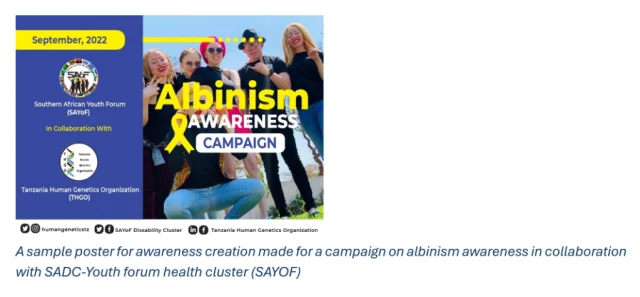
[/bt_bb_text][/bt_bb_column_inner][/bt_bb_row_inner][bt_bb_row_inner bb_version=”5.2.6″][bt_bb_column_inner width=”1/1″ width_xl=”1/1″ width_lg=”1/1″ width_md=”1/1″ width_sm=”1/1″ width_xs=”1/1″ order=”0″ lazy_load=”yes” highlight=”no” bb_version=”5.2.6″][bt_bb_text bb_version=”5.2.6″ responsive=”” publish_datetime=”” expiry_datetime=”” animation=”no_animation,;,,;,,;,,;,,;,” el_id=”” el_class=”” el_style=”” ai_prompt_helper=”eyJrZXl3b3JkcyI6IiIsInRvbmUiOiIiLCJtb2RlIjoiZ2VuZXJhdGUiLCJsYW5ndWFnZSI6IiIsImxlbmd0aCI6IiJ9″]
2. Conferences and symposia
THGO provides a platform for researchers to meet, exchange knowledge and communicate their research findings. We do so through annual conferences and symposia which we usually host as hybrid events to cater to both in-person and virtual audiences. The conferences have grown since 2019 attracting diverse local and international audiences, underscoring their need. This year’s conference will be hosted in June, it will be announced on the website and social media pages of the Society.
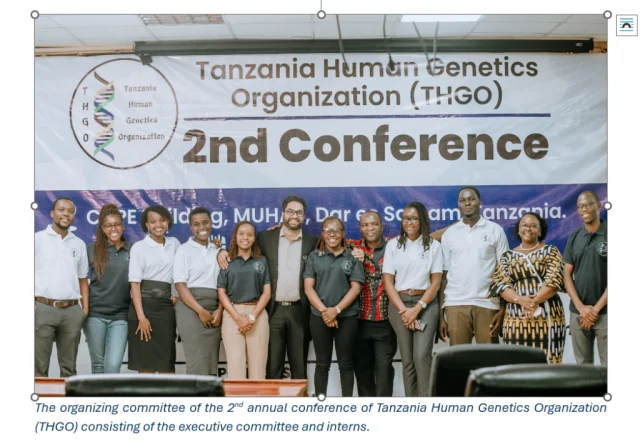
[/bt_bb_text][/bt_bb_column_inner][/bt_bb_row_inner][bt_bb_row_inner bb_version=”5.2.6″][bt_bb_column_inner width=”1/1″ width_xl=”1/1″ width_lg=”1/1″ width_md=”1/1″ width_sm=”1/1″ width_xs=”1/1″ order=”0,;,,;,,;,,;,,;,” lazy_load=”yes” highlight=”no” bb_version=”5.2.6″ align=”left,;,,;,,;,,;,,;,” padding=”normal,;,,;,,;,,;,,;,” vertical_align=”top” animation=”no_animation,;,,;,,;,,;,,;,” background_image=”” inner_background_image=”” background_color=”” inner_background_color=”” opacity=”” background_position=”” background_size=”” inner_background_position=”” inner_background_size=”” responsive=”” publish_datetime=”” expiry_datetime=”” el_id=”” el_class=”” el_style=””][bt_bb_text bb_version=”5.2.6″ ai_prompt_helper=”eyJrZXl3b3JkcyI6IiIsInRvbmUiOiIiLCJtb2RlIjoiZ2VuZXJhdGUiLCJsYW5ndWFnZSI6IiIsImxlbmd0aCI6IiJ9″]
3. Mentorship of early career researchers (ECRs)
Since inception THGO has strived to build the future generation of human geneticists by providing mentorship to early career researchers (ECRs) in the fields of medicine, molecular biology and other life sciences. The mentees have benefited directly and indirectly. Directly, THGO runs internship programs in advocacy and research where interns get an opportunity to gain hands on practical skills. This way they not only gain valuable skills such as social media management and events organization, but they also help run the Society activities. Further, the Society provides growth and career opportunities to its members as well as career guidance to students and ECRs. These individuals have gone to take bigger roles in different organizations and/or pursue higher studies. They truly are the future of human genetics in Tanzania.

THGO has also been able provide mentorship of upcoming human genetics societies, such as the Tunisian Society of Human Genetics (TSHG), a remarkable milestone of growth.
[/bt_bb_text][/bt_bb_column_inner][/bt_bb_row_inner][bt_bb_row_inner bb_version=”5.2.6″][bt_bb_column_inner width=”1/1″ width_xl=”1/1″ width_lg=”1/1″ width_md=”1/1″ width_sm=”1/1″ width_xs=”1/1″ order=”0,;,,;,,;,,;,,;,” lazy_load=”yes” highlight=”no” bb_version=”5.2.6″ align=”left,;,,;,,;,,;,,;,” padding=”normal,;,,;,,;,,;,,;,” vertical_align=”top” animation=”no_animation,;,,;,,;,,;,,;,” background_image=”” inner_background_image=”” background_color=”” inner_background_color=”” opacity=”” background_position=”” background_size=”” inner_background_position=”” inner_background_size=”” responsive=”” publish_datetime=”” expiry_datetime=”” el_id=”” el_class=”” el_style=””][bt_bb_text bb_version=”5.2.6″ ai_prompt_helper=”eyJrZXl3b3JkcyI6IiIsInRvbmUiOiIiLCJtb2RlIjoiZ2VuZXJhdGUiLCJsYW5ndWFnZSI6IiIsImxlbmd0aCI6IiJ9″]
4. Capacity building via training
Over the years, THGO has sought to build capacity for its members, interns and the general public in human genetics advocacy. We have partnered with other organizations in Tanzania and beyond to deliver virtual, in-person and hybrid training. We especially take advantage of the internet to delivery training despite resources constraints thereby reaching a wider audience.
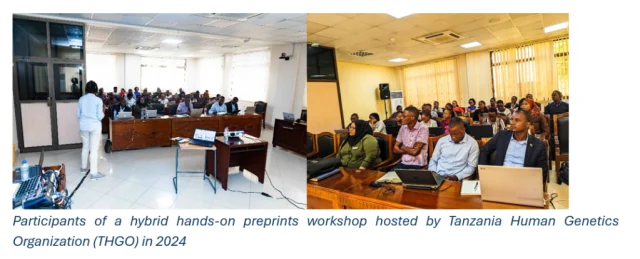
The training we give focuses on addressing actual needs at a particular moment, targeting a specific group. For example, last year we hosted a hybrid workshop on Introduction to Genetics, Ethics and Society in response to a needs survey conducted earlier. The training was conducted in partnership with Stanford School of Medicine. In the same year we held a training on preprints as a tool for research communication in partnership with ASAPbio and Biotechnology Society of Tanzania, with the target group being early career researchers. These training courses equip participants with the necessary knowledge and skills and allows them to advocate for human genetics to lay and scientific audiences.
[/bt_bb_text][/bt_bb_column_inner][/bt_bb_row_inner][bt_bb_row_inner bb_version=”5.2.6″][bt_bb_column_inner width=”1/1″ width_xl=”1/1″ width_lg=”1/1″ width_md=”1/1″ width_sm=”1/1″ width_xs=”1/1″ order=”0,;,,;,,;,,;,,;,” lazy_load=”yes” highlight=”no” bb_version=”5.2.6″ align=”left,;,,;,,;,,;,,;,” padding=”normal,;,,;,,;,,;,,;,” vertical_align=”top” animation=”no_animation,;,,;,,;,,;,,;,” background_image=”” inner_background_image=”” background_color=”” inner_background_color=”” opacity=”” background_position=”” background_size=”” inner_background_position=”” inner_background_size=”” responsive=”” publish_datetime=”” expiry_datetime=”” el_id=”” el_class=”” el_style=””][bt_bb_text bb_version=”5.2.6″ ai_prompt_helper=”eyJrZXl3b3JkcyI6IiIsInRvbmUiOiIiLCJtb2RlIjoiZ2VuZXJhdGUiLCJsYW5ndWFnZSI6IiIsImxlbmd0aCI6IiJ9″]
5. Stakeholder engagement and collaboration
THGO has been working closely with various stakeholders in Tanzania and beyond to promote awareness of and advocate for human genetics. Here we highlight a few.
In Tanzania, we have worked closely with patient advocacy groups including Ali Kimara Rare Disease Foundation (AKRDF), Lupus Awareness and Support Foundation (LASF) and Epilepsy Organization of Tanzania, Malcolm Foundation and Tanzania Epilepsy Organization. These engagements inform our activities and help us design initiatives that touch real lives.
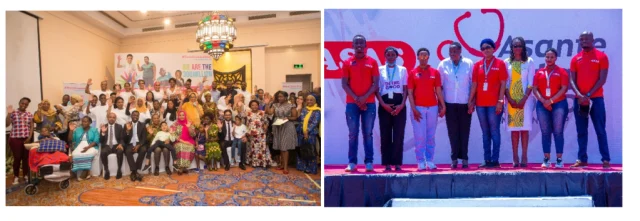
We also work closely with other professional societies to increase efficiency and maximize our impact, human genetics being a multifaceted issue. One such example is our engagement with the Tanzania Oncology Society (TOS). Out of Tanzania, THGO works closely with the African Society of Human Genetics (AfSHG), benefiting from its support and learning from other human genetics societies from Africa. We also work with patient advocacy groups in the southern of Africa, forming a coalition against rare diseases geared towards awareness creation and influencing policy.

Understanding the importance of government buy-in and support, THGO has sought to engage different public entities in support of its general mission and specific projects. We have established memorandums of understanding with the National Institute of Medical Research (NIMR) and Zanzibar Health Research Institute (ZAHRI) and work closely with the Government Chief Chemist through the Government Chemist Laboratory Authority (GLCA). Further, we have often engaged government leaders and policy makers at various occasions in search of support for various projects and initiatives.
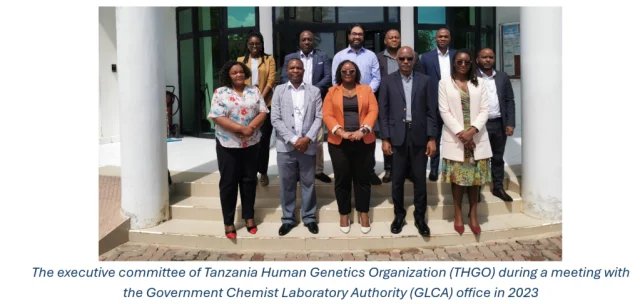
[/bt_bb_text][/bt_bb_column_inner][/bt_bb_row_inner][bt_bb_row_inner bb_version=”5.2.6″][bt_bb_column_inner width=”1/1″ width_xl=”1/1″ width_lg=”1/1″ width_md=”1/1″ width_sm=”1/1″ width_xs=”1/1″ order=”0,;,,;,,;,,;,,;,” lazy_load=”yes” highlight=”no” bb_version=”5.2.6″ align=”left,;,,;,,;,,;,,;,” padding=”normal,;,,;,,;,,;,,;,” vertical_align=”top” animation=”no_animation,;,,;,,;,,;,,;,” background_image=”” inner_background_image=”” background_color=”” inner_background_color=”” opacity=”” background_position=”” background_size=”” inner_background_position=”” inner_background_size=”” responsive=”” publish_datetime=”” expiry_datetime=”” el_id=”” el_class=”” el_style=””][bt_bb_text bb_version=”5.2.6″ ai_prompt_helper=”eyJrZXl3b3JkcyI6IiIsInRvbmUiOiIiLCJtb2RlIjoiZ2VuZXJhdGUiLCJsYW5ndWFnZSI6IiIsImxlbmd0aCI6IiJ9″]
6. Influencing human genetics policy
An enabling policy environment is crucial for research and application of human genetics. Our advocacy efforts to influence policy in the field have involved direct engagement of policy makers and writing policy papers. Engaging policy makers ensure that they are aware of our activities and understand their significance. It also helps to get buy-in for different projects.

Several policy statements and papers have been produced from THGO. One call to action outlined policy needs for rare diseases in Tanzania, while another position statement does the same for the Southern Africa Development Community (SADC) region. We are currently developing a human genetics agenda for the country in collaboration with other state actors after a meeting to gather perspectives and opinions from stakeholders.

Reflecting on the journey of the past few years brings a sense of accomplishment but also highlights the challenges ahead. Human genetics research and application is still low in Tanzania and genetic conditions such as majority of rare diseases are still a challenge. Establishing a database for Tanzania genetic variation continues to be at the fore front of the Society. Further, research, diagnosis and therapies for genetic disorders and rare diseases are still a far reality in the country. THGO’s mission is to engage the status quo to provide genetic solutions.
[/bt_bb_text][/bt_bb_column_inner][/bt_bb_row_inner][bt_bb_row_inner bb_version=”5.2.6″][bt_bb_column_inner width=”1/1″ width_xl=”1/1″ width_lg=”1/1″ width_md=”1/1″ width_sm=”1/1″ width_xs=”1/1″ order=”0,;,,;,,;,,;,,;,” lazy_load=”yes” highlight=”no” bb_version=”5.2.6″ align=”left,;,,;,,;,,;,,;,” padding=”normal,;,,;,,;,,;,,;,” vertical_align=”top” animation=”no_animation,;,,;,,;,,;,,;,” background_image=”” inner_background_image=”” background_color=”” inner_background_color=”” opacity=”” background_position=”” background_size=”” inner_background_position=”” inner_background_size=”” responsive=”” publish_datetime=”” expiry_datetime=”” el_id=”” el_class=”” el_style=””][bt_bb_text bb_version=”5.2.6″ ai_prompt_helper=”eyJrZXl3b3JkcyI6IiIsInRvbmUiOiIiLCJtb2RlIjoiZ2VuZXJhdGUiLCJsYW5ndWFnZSI6IiIsImxlbmd0aCI6IiJ9″]
Acknowledgement:
I express my heartfelt appreciation to the Pan-African PGS Education and Research Initiative (PAPERI) for publishing this blog

[/bt_bb_text][bt_bb_separator bb_version=”5.2.6″ top_spacing=”normal,;,,;,,;,,;,,;,” bottom_spacing=”normal,;,,;,,;,,;,,;,” border_style=”solid” border_width=”4″ responsive=”” publish_datetime=”” expiry_datetime=”” animation=”no_animation,;,,;,,;,,;,,;,” el_id=”” el_class=”” el_style=””][/bt_bb_separator][bt_bb_text bb_version=”5.2.6″ ai_prompt_helper=”eyJrZXl3b3JkcyI6IiIsInRvbmUiOiIiLCJtb2RlIjoiZ2VuZXJhdGUiLCJsYW5ndWFnZSI6IiIsImxlbmd0aCI6IiJ9″]
First published on the Pan-African PGS Education and Research Initiative (PAPERI)
[/bt_bb_text][/bt_bb_column_inner][/bt_bb_row_inner][/bt_bb_column][bt_bb_column order=”0,;,,;,,;,,;,,;,” lazy_load=”yes” highlight=”no” align_to_edge_column=”no” bb_version=”5.2.6″ width=”1/3″ width_xl=”1/3″ width_lg=”1/3″ width_md=”1/1″ width_sm=”1/1″ width_xs=”1/1″ align=”left,;,,;,,;,,;,,;,” vertical_align=”top” animation=”no_animation,;,,;,,;,,;,,;,” padding=”normal,;,,;,,;,,;,,;,” background_image=”” inner_background_image=”” background_color=”” inner_background_color=”” opacity=”” background_position=”” background_size=”” inner_background_position=”” inner_background_size=”” responsive=”hidden_xs hidden_ms” publish_datetime=”” expiry_datetime=”” el_id=”” el_class=”” el_style=””][bt_bb_css_post_grid columns=”1″ img_base_size=”large” bb_version=”5.2.6″ post_type=”post” initial_items_number=”” auto_loading=”” gap=”small” shape=”inherit” format=”” category=”” category_filter=”no” title_html_tag=”h6″ show_in_superheadline=”category date” show_in_subheadline=”” show_excerpt=”” show_share=”” title_lines=”” excerpt_lines=”” hover_style=”zoom” responsive=”” publish_datetime=”” expiry_datetime=”” animation=”no_animation,;,,;,,;,,;,,;,” el_id=”” el_class=”” el_style=””][/bt_bb_css_post_grid][/bt_bb_column][/bt_bb_row][/bt_bb_section][bt_bb_section layout=”boxed_1200″ lazy_load=”yes” show_boxed_content=”no” allow_content_outside=”no” bb_version=”5.2.6″][bt_bb_row][bt_bb_column order=”0″ lazy_load=”yes” highlight=”no” align_to_edge_column=”no” bb_version=”5.2.6″ width=”1/1″ width_xl=”1/1″ width_lg=”1/1″ width_md=”1/1″ width_sm=”1/1″ width_xs=”1/1″][bt_bb_separator bb_version=”5.2.6″ top_spacing=”normal,;,,;,,;,,;,,;,” bottom_spacing=”none,;,,;,,;,,;,,;,” border_style=”none” border_width=”” responsive=”” publish_datetime=”” expiry_datetime=”” animation=”no_animation,;,,;,,;,,;,,;,” el_id=”” el_class=”” el_style=””][/bt_bb_separator][bt_bb_button font_subset=”latin,latin-ext” font_load_extension=”” bb_version=”5.2.6″][/bt_bb_button][/bt_bb_column][/bt_bb_row][/bt_bb_section]



Leave a Reply